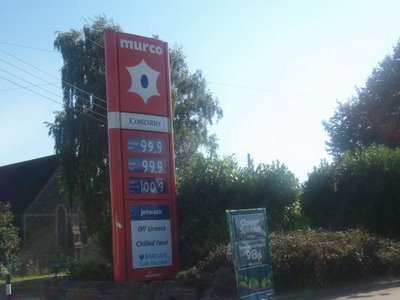
Petrol is now generally above the £1 a litre bracket, and it ain’t going to fall any time soon, if ever.
So what about alternatives? LPG is less than 50p a litre. That’s the future isn’t it - alternatives to petrol? Well, yes and no. There are alternatives to petrol but they all suffer from the same problems - affordability, technological shortfall, climate change contributions (direct or indirect) and oomph.
Oomph is that delicious feeling you get with high octane petrol when the vehicle responds powerfully as you put your foot on the pedal to get past that idiot grandad doing 20 in a 60 mile an hour zone. You won’t get that with the alternatives. You’ll find it sluggish and gutless as the alternative just won’t have that octane rush. It ain’t going to be there.
All the alternatives will add to climate change, even the best option which is the electric vehicle using wind or solar power to charge the batteries. There will still be a large energy requirement in making and maintaining the car, windmill or solar panel. The other options are far worse - particularly biofuel which will hardly produce more energy than goes into its manufacture.
The technological shortfall is there for all to see, with no real viable alternatives to cheap oil finding their way on to the real market. It is quite simply never going to be as easy to run vehicles as it has been over the last 100 years. Cheap oil was a unique situation, the lazy man’s way to transport. Hydrogen, biofuel, even electric cars are all pipedreams except at the margins.
But the real crunch is economic. Our all-embracing cradle-to-grave government depends on the tax take from cheap oil to keep everything afloat. This is the main reason huge investment in the only real alternative - heavy and light rail - is still a few years off. Motorists fall over each other to hand governments billions in taxes - road tax, fuel tax etc. Then they pay more to maintain the roads.
Even this government is not totally stupid. They know that this tax take will reduce year on year, even with the increasing cost of fuel. They’ll either have to be inventive or honest in the future. They really need to be saying now that the Oil Age is Over - that we need to roll back suburbia, switch investment to rail, create incentives to allow young people the right to travel in the future (by rail rather than car), to build the infrastructure to keep moving our freight (new railways) and moving people (railways and tramways). They need to invest heavily in dedicated cycleways and bridleways so that truly sustainable transport (bikes and horses) become even more popular.
And they need, most of all, to forget a useful tax take from transport in the coming decades. They can either spend less on big inhuman-scale projects - city hospitals, ring roads, road pricing, ID cards, military drivel, foreign adventures - or create a truly sustainable tax system, localised and transparent.


No comments:
Post a Comment